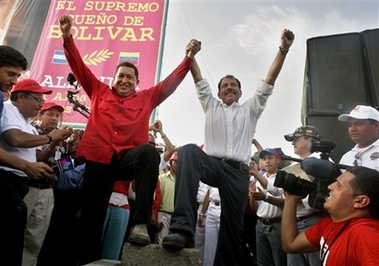Chavez: Critical foreigners to get boot
(AP)Updated: 2007-07-24 10:42
CARACAS, Venezuela - President Hugo Chavez said Sunday that foreigners who publicly criticize him or his government while visiting Venezuela will be expelled from the country.
"How long are we going to allow a person - from any country in the world - to come to our own house to say there's a dictatorship here, that the president is a tyrant, and nobody does anything about it?" Chavez asked during his weekly television and radio program.
The Venezuelan leader's statements came after Manuel Espino, the president of Mexico's conservative ruling party, criticized Chavez during a recent pro-democracy forum in Caracas.
Government opponents argue Chavez is becoming increasingly authoritarian and cracking down on dissent as he steers oil-rich Venezuela toward what he calls "21st-century socialism."
Chavez rejects such allegations, countering that democratic freedoms have been extended since he was first elected in 1998. The former paratroop commander says his government has empowered the poor by giving them increased decision-making authority in politics.
During Sunday's six-hour program, Chavez assured private property owners their rights will be guaranteed under a pending constitutional reform.
"Private property will respected," he said.
Many wealthy Venezuelans fear second homes, yachts or other assets could be seized as Chavez advances his Bolivarian Revolution, a movement named after South American independence hero Simon Bolivar. Chavez denies any such plans.
Chavez is expected to present his reform proposal to the National Assembly, which is completely controlled by his allies, in the coming weeks. Few details have emerged from a special executive committee that he appointed to draft a proposal for overhauling the country's charter.
Also Sunday, Chavez announced an initiative to slash the salaries of Venezuela's top public servants. He said no public servant should make more than $7,000 a month. Most Venezuelans make minimum wage - roughly $250 a month.
Reducing the pay of top officials has become a popular move in Latin America. The presidents Nicaragua, Bolivia, Peru and Costa Rica recently cut salaries, including their own, in response to widespread criticism.
In his typically wide-ranging television program, Chavez also said Castro recently warned him to take precautions against possible US-backed assassination attempts.
He said Cuba's 80-year-old "Maximum Leader" gave him a copy of former CIA Director George Tenet's recently published memoir and told him: "'Read it, Chavez, because that is the most perfect killing machine ever invented and I'm a survivor ... I survived more than 600 (assassination) attempts.'"
"The CIA is everywhere," said Chavez, who has repeatedly warned that US President George W. Bush could order him killed.
US law has forbidden assassination attempts since the 1970s, and Washington denies the US government has attempted to kill Castro since then.
|
|
|
||
|
||
|
|

